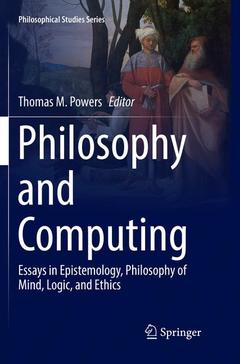Philosophy and Computing, Softcover reprint of the original 1st ed. 2017 Essays in Epistemology, Philosophy of Mind, Logic, and Ethics Philosophical Studies Series, Vol. 128
Coordonnateur : Powers Thomas M.

This book features papers from CEPE-IACAP 2015, a joint international conference focused on the philosophy of computing. Inside, readers will discover essays that explore current issues in epistemology, philosophy of mind, logic, and philosophy of science from the lens of computation. Coverage also examines applied issues related to ethical, social, and political interest.
The contributors first explore how computation has changed philosophical inquiry. Computers are now capable of joining humans in exploring foundational issues. Thus, we can ponder machine-generated explanation, thought, agency, and other quite fascinating concepts.
The papers are also concerned with normative aspects of the computer and information technology revolution. They examine technology-specific analyses of key challenges, from Big Data to autonomous robots to expert systems for infrastructure control and financial services. The virtue of a collection that ranges over philosophical questions, such as this one does, lies in the prospects for a more integrated understanding of issues. These are early days in the partnership between philosophy and information technology. Philosophers and researchers are still sorting out many foundational issues. They will need to deploy all of the tools of philosophy to establish this foundation. This volume admirably showcases those tools in the hands of some excellent scholars.Introduction: Situating Computing in Philosophy (Thomas M. Powers).- Chapter 1. Levels of Computational Explanation (Michael Rescorla).- Chapter 2. On the Relation of Computing to the World ( William J. Rapaport).- Chapter 3. Cognitive Computation sans Representation (Paul Schweizer).- Chapter 4. Software Error as a Limit to Inquiry for Finite Agents: Challenges for the Post-human Scientist (John F. Symons and Jack K. Horner).- Chapter 5. The Singularity Business: Toward a Realistic, Fine-grained Economics for an AI-Infused World (Selmer Bringsjord).- Chapter 6. Artificial Moral Cognition: from Functionalism to Autonomous Moral Agents (Don Howard and Ioan Muntean).- Chapter 7. AI and the Automation Of Wisdom (Shannon Vallor).- Chapter 8. An Analysis of Machine Ethics from the Perspective of Autonomy (Mario Verdicchio
).- Chapter 9. Beyond Informed Consent: Investigating Ethical Justifications for Disclosing, Donating or Sharing Personal Data in Research (Markus Christen, Josep Domingo-Ferrer, Dominik Herrmann, Jeroen van den Hoven).- Chapter 10. Big Data, Digital Traces and the Metaphysics of the Self (Soraj Hongladarom).- Chapter 11. Why Big Data Needs the Virtues (Frances S. Grodzinsky).Thomas M. Powers is the founding director of the Center for Science, Ethics, and Public Policy at the University of Delaware. He holds appointments as Associate Professor in the Philosophy Department and the Delaware Biotechnology Institute. His research concerns ethics in science and engineering, the philosophy of technology, and environmental ethics, and his publications range from topics in artificial intelligence and robotic ethics to the ethical aspects of design. Powers received a B.A. in philosophy (College of William and Mary) and a Ph.D. in philosophy (University of Texas at Austin). He has been a DAAD-Fulbright dissertation-year fellow at the Ludwig-Maximilians-Universität in Munich, a National Science Foundation fellow in the School of Engineering and Applied Science at the University of Virginia, and a visiting researcher (2015) at the Université Pierre et Marie Curie, Laboratoire d'Informatique – Équipe: Agents Cognitifs et A
pprentissage SymboliqueAutomatique.Surveys critical emerging issues in the philosophy of computing
Examines how computation has changed philosophical inquiry
Explores applied issues related to ethical, social, and political interest
Date de parution : 08-2018
Ouvrage de 242 p.
15.5x23.5 cm
Disponible chez l'éditeur (délai d'approvisionnement : 15 jours).
Prix indicatif 116,04 €
Ajouter au panierDate de parution : 11-2017
Ouvrage de 242 p.
15.5x23.5 cm
Disponible chez l'éditeur (délai d'approvisionnement : 15 jours).
Prix indicatif 116,04 €
Ajouter au panierThème de Philosophy and Computing :
Mots-clés :
Philosophy of Computing; Computer Ethics; Artificial Agents; Machine Ethics; Autonomous Moral Agents; Computers Epistemology; Computers philosophy of mind; Computers philosophy of science; Computers political unrest; Machine agency; Machine thought; Machine generated explanation; Robots Big Data; engineering ethics
